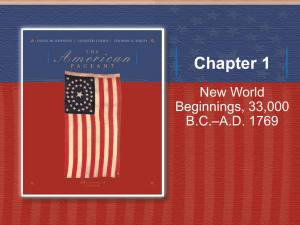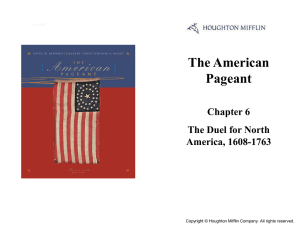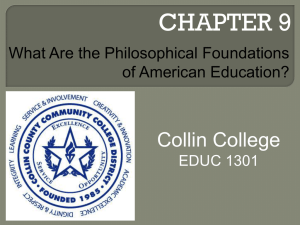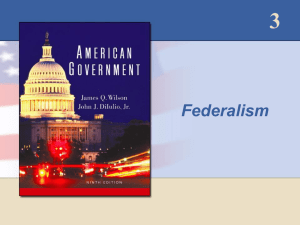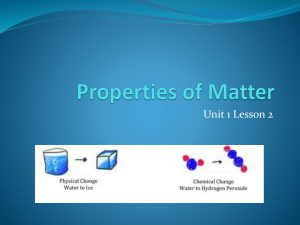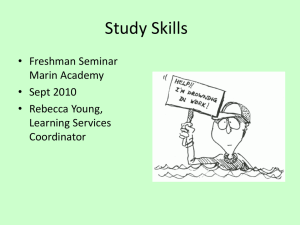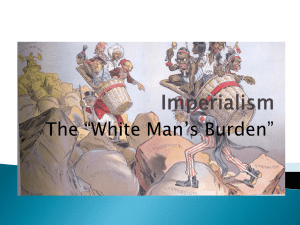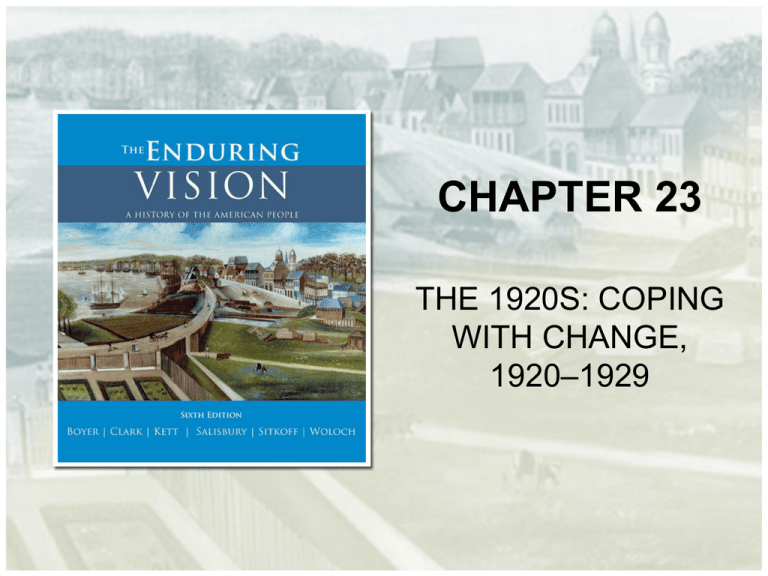
CHAPTER 23
THE 1920S: COPING
WITH CHANGE,
1920–1929
Question 1
“Fordism” referred to
a) the forming of large holding companies, or
trusts, that dominated a single industry.
b) mass-production through assembly-line
methods.
c) the growing influence of big business in
American politics.
d) the retirement pensions offered to workers in
the auto industry.
Copyright © Houghton Mifflin Company. All rights reserved.
23 | 2
Answer
“Fordism” referred to
a) the forming of large holding companies, or
trusts, that dominated a single industry.
b) mass-production through assembly-line
methods. (CORRECT)
c) the growing influence of big business in
American politics.
d) the retirement pensions offered to workers in
the auto industry.
Copyright © Houghton Mifflin Company. All rights reserved.
23 | 3
Question 2
The “Teapot Dome” scandal took place during the
administration of which U.S. president?
a) Warren G. Harding
b) Calvin Coolidge
c) Herbert Hoover
d) Woodrow Wilson
Copyright © Houghton Mifflin Company. All rights reserved.
23 | 4
Answer
The “Teapot Dome” scandal took place during the
administration of which U.S. president?
a) Warren G. Harding (CORRECT)
b) Calvin Coolidge
c) Herbert Hoover
d) Woodrow Wilson
Copyright © Houghton Mifflin Company. All rights reserved.
23 | 5
Question 3
The policies of Warren Harding and Calvin
Coolidge primarily served the interests of
a) labor unions.
b) the rural poor.
c) big business.
d) feminists.
Copyright © Houghton Mifflin Company. All rights reserved.
23 | 6
Answer
The policies of Warren Harding and Calvin
Coolidge primarily served the interests of
a) labor unions.
b) the rural poor.
c) big business. (CORRECT)
d) feminists.
Copyright © Houghton Mifflin Company. All rights reserved.
23 | 7
Question 4
Which consumer product of the 1920s had the
most profound impact on American society?
a) the refrigerator
b) the television
c) canned fruits and vegetables
d) the automobile
Copyright © Houghton Mifflin Company. All rights reserved.
23 | 8
Answer
Which consumer product of the 1920s had the
most profound impact on American society?
a) the refrigerator
b) the television
c) canned fruits and vegetables
d) the automobile (CORRECT)
Copyright © Houghton Mifflin Company. All rights reserved.
23 | 9
Question 5
Charles Lindbergh
a) became one of the most famous celebrities
of the 1920s.
b) was the first person to fly nonstop from San
Francisco to New York City.
c) conducted an unsuccessful bid for the
presidency in 1928.
d) disappeared over the Atlantic Ocean in
1926.
Copyright © Houghton Mifflin Company. All rights reserved.
23 | 10
Answer
Charles Lindbergh
a) became one of the most famous celebrities
of the 1920s. (CORRECT)
b) was the first person to fly nonstop from San
Francisco to New York City.
c) conducted an unsuccessful bid for the
presidency in 1928.
d) disappeared over the Atlantic Ocean in
1926.
Copyright © Houghton Mifflin Company. All rights reserved.
23 | 11
Question 6
Which of the following was NOT an important Jazz
Age writer?
a) Ernest Hemingway
b) Sinclair Lewis
c) Saul Bellow
d) F. Scott Fitzgerald
Copyright © Houghton Mifflin Company. All rights reserved.
23 | 12
Answer
Which of the following was NOT an important Jazz
Age writer?
a) Ernest Hemingway
b) Sinclair Lewis
c) Saul Bellow (CORRECT)
d) F. Scott Fitzgerald
Copyright © Houghton Mifflin Company. All rights reserved.
23 | 13
Question 7
The Harlem Renaissance
a) passed unnoticed by people outside of New
York’s black community.
b) was a movement by black painters to adopt
the classical styles of Renaissance Italy.
c) received a measure of support from the
white cultural establishment.
d) was an entirely male-dominated movement.
Copyright © Houghton Mifflin Company. All rights reserved.
23 | 14
Answer
The Harlem Renaissance
a) passed unnoticed by people outside of New
York’s black community.
b) was a movement by black painters to adopt
the classical styles of Renaissance Italy.
c) received a measure of support from the
white cultural establishment. (CORRECT)
d) was an entirely male-dominated movement.
Copyright © Houghton Mifflin Company. All rights reserved.
23 | 15
Question 8
The National Origins Act of 1924
a) restricted immigration from Mexico and
South America.
b) was directed primarily at immigrants from
eastern and southern Europe.
c) required immigrants from Japan and China
to live in specified west-coast communities.
d) was vetoed by Calvin Coolidge.
Copyright © Houghton Mifflin Company. All rights reserved.
23 | 16
Answer
The National Origins Act of 1924
a) restricted immigration from Mexico and
South America.
b) was directed primarily at immigrants from
eastern and southern Europe. (CORRECT)
c) required immigrants from Japan and China
to live in specified west-coast communities.
d) was vetoed by Calvin Coolidge.
Copyright © Houghton Mifflin Company. All rights reserved.
23 | 17
Question 9
The 1925 trial that pitted defenders of evolution
against religious fundamentalists was known as
a) the Scopes Trial.
b) the Sacco-Vanzetti Case.
c) the David Stephenson Trial.
d) Ozawa v. United States.
Copyright © Houghton Mifflin Company. All rights reserved.
23 | 18
Answer
The 1925 trial that pitted defenders of evolution
against religious fundamentalists was known as
a) the Scopes Trial. (CORRECT)
b) the Sacco-Vanzetti Case.
c) the David Stephenson Trial.
d) Ozawa v. United States.
Copyright © Houghton Mifflin Company. All rights reserved.
23 | 19
Question 10
Herbert Hoover’s political philosophy was based
on a strong belief in
a) the government’s obligations to provide social
welfare to the less fortunate.
b) the power of voluntary corporate cooperation
to create a socially responsible economic
order.
c) the need for America to exercise its military
strength abroad.
d) the tenets of socialism.
Copyright © Houghton Mifflin Company. All rights reserved.
23 | 20
Answer
Herbert Hoover’s political philosophy was based
on a strong belief in
a) the government’s obligations to provide
social welfare to the less fortunate.
b) the power of voluntary corporate
cooperation to create a socially responsible
economic order. (CORRECT)
c) the need for America to exercise its military
strength abroad.
d) the tenets of socialism.
Copyright © Houghton Mifflin Company. All rights reserved.
23 | 21

